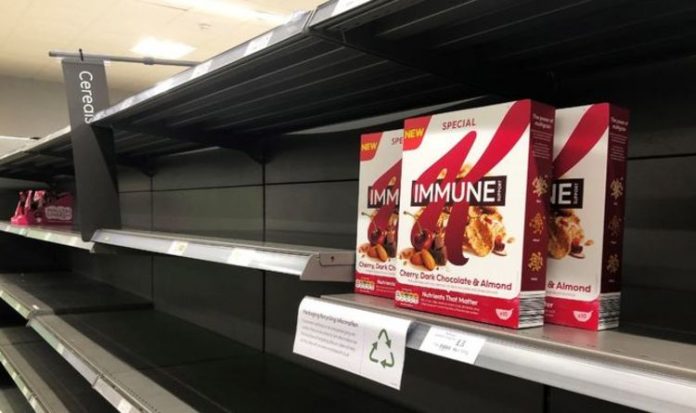Brexit trade talks have continually hit a wall, with a Brexit trade deal looking less and less likely as the deadline looms closer. Both sides are now increasingly aware of the prospect of a no-deal Brexit, as each has failed to reach a compromise over what access Britain will have to EU markets and goods following the end of this year.
The Department for Environment, Food and Rural Affairs (DEFRA) said consumers should be assured they will still continue to have access to a “range” of different products post Brexit.
The department said: “The UK has a high level of food security built upon a diverse range of sources including strong domestic production and imports from other countries.
“This will continue to be the case whether we leave with or without a deal.”
The beginning of the coronavirus crisis saw shoppers scramble in supermarkets for supplies like toilet roll and pasta, amid fears of a lockdown.
What should I buy if I need to stockpile?
Food with a short shelf life is obviously a non-starter as it won’t last long and will need to be eaten not long after going in the fridge.
You need to think about packed, tinned and frozen goods as well as non-food items like toilet roll, cleaning products and toiletries.
Dry carbohydrates like rice, pasta and cereals.
Pulses and beans (kidney beans, butter beans, black beans, chickpeas).
Tinned vegetables (carrots, sweetcorn, peas, potatoes).
Tinned fish (tuna, sardines, anchovies) or meat.
Soups, chopped tomatoes and other sauces (tomato purree).
Herbs, spices and olive oils.
Tinned olives, pickled capers and jarred peppers.
Dried fruits, nuts and sweets.
Coffee and teabags.
Things like milk are generally supplied from British farms, so it is unlikely it would run out.
If you are worried about nutrients and a lack of access to affordable fresh food, an idea is to batch cook healthy meals ahead of time and freeze them to be eaten later.
A double whammy in becoming more self sustainable and cost saving, if you have an allotment or garden, you should grow your own vegetables.







